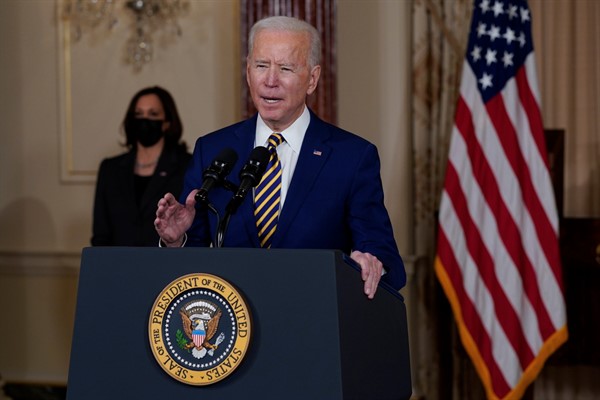
President Joe Biden took office with an ambitious U.S. foreign policy agenda summed up by his favorite campaign tagline: “America is back.” Above all, that meant repairing the damage done to America’s global standing by his predecessor, former President Donald Trump. During his four years in office, Trump strained ties with America’s allies in Europe and Asia, raised tensions with adversaries like Iran and Venezuela, and engaged in a trade war with China that left bilateral relations in their worst state in decades.
In principle, Biden’s agenda is rooted in a repudiation of Trump’s “America First” legacy and the restoration of the multilateral order. That was reflected in his early moves to rejoin the Paris Climate Accords and the World Health Organization, and reestablish U.S. leadership on climate diplomacy. The COVID-19 pandemic also offered Biden an opportunity to reassert America’s global leadership role and begin repairing ties that began to fray under Trump.
But in practice, some of Biden’s priorities bear a close resemblance to Trump’s agenda. His “foreign policy for the middle class,” which ties U.S. diplomacy to peace, security and prosperity at home, has been described as a dressed-up version of Trump’s emphasis on putting U.S. interests above its global commitments. Biden also followed through on Trump’s deal to withdraw from Afghanistan without consulting or coordinating with Washington’s NATO allies—and paid a political cost for the collapse of the Afghan government and chaotic evacuation that ensued. And on other issues, like his approach to immigration and border policies, Biden has not demonstrated any urgency to make immediate changes. Similarly, he only belatedly lifted controversial tariffs on European steel and aluminum imports as well as, more recently, the most draconian of Trump’s sanctions on Cuba.
Despite the rhetorical commitment to repudiating Trump, Biden may find it difficult to fully restore a pre-Trump status quo. Countries may no longer be willing to follow the U.S. lead on democracy promotion after the erosion of America’s democratic norms during the Trump era. And Europe, in particular, has recalibrated its relationship with the United States and may no longer be willing to align with America’s approach, particularly the hardening of relations with China. Nevertheless, as the war in Ukraine and the crisis leading up to it highlight, there is still high demand among allies, partners and other countries around the world for decisive U.S. leadership in times of crisis.
No comments:
Post a Comment